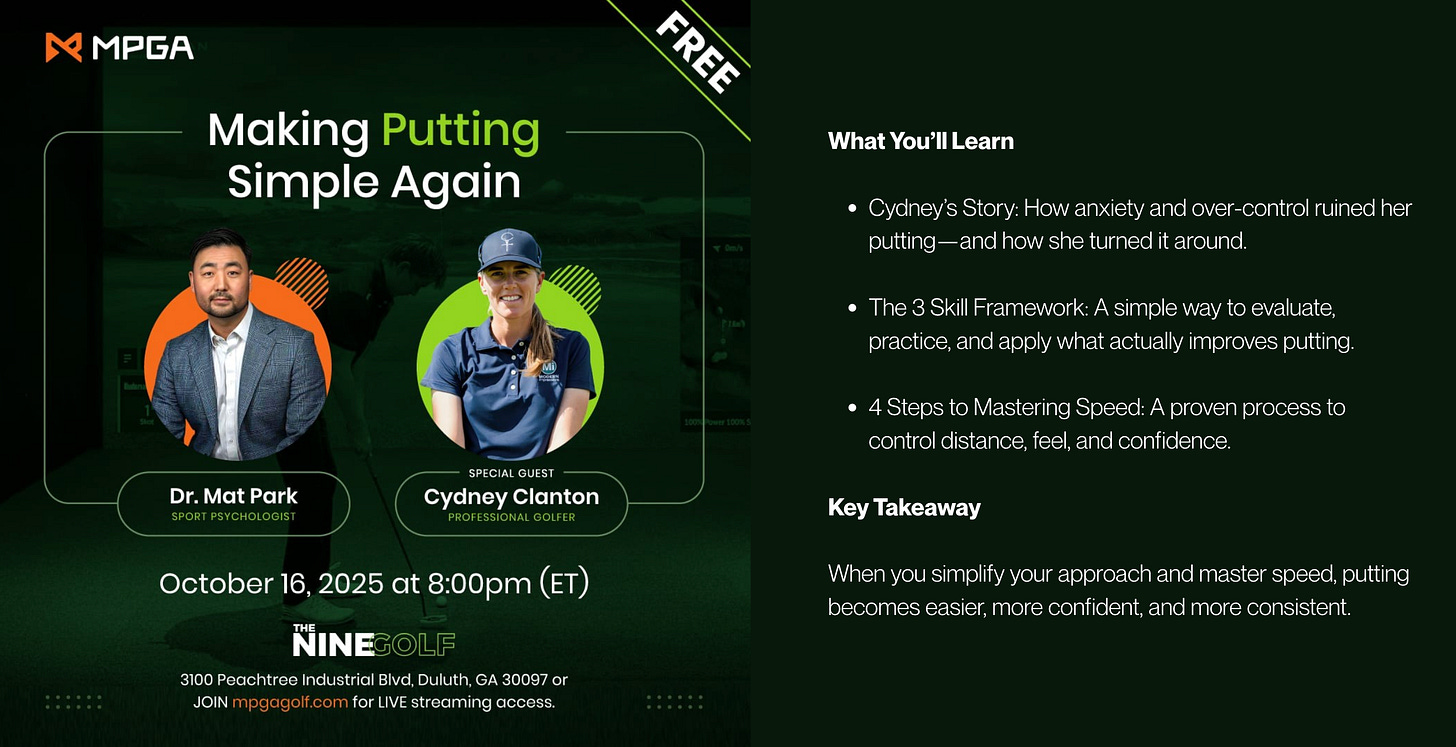Anxiety is sneaky.
It disguises itself as caring too much.
It tells you the outcome defines you.
But here’s the truth: anxiety and excitement are almost identical inside your body. Your heart races, your breathing quickens, your focus sharpens. The only difference is the label you give it.
Last summer, I began working with Ryan, a Division 1 college golfer. When I first met him, he was a confident player who could strike the ball beautifully from tee to green. But something strange happened when he reached the putting surface. He’d walk up to a three-foot putt and freeze.
His stroke looked different: stiff, cautious, unsure. He’d miss one, then another, and suddenly everything unraveled. He told me he hated short putts. Not because they were hard, but because he should make them. That word “should,” came up a lot.
When we sat down for our first session, I asked him what goes through his mind standing over those short putts. He said, “I just don’t want to miss. Everyone expects me to make it. It’s only three feet.”
Then I asked him about his long putts… the ten, twelve, fifteen-footers that he seemed to roll so freely. He smiled and said something I’ll never forget:
“The short ones feel like a test. The long ones feel like a chance.”
That line stopped me. It was such an honest look into how pressure works.
The putt didn’t change. The distance did. But what really changed was the meaning he gave to it.
When something feels like a test, your brain shifts into threat mode. You tighten up, your breathing shallows, your body prepares for danger, not performance. The harder you try to be perfect, the less natural your movement becomes.
But when something feels like a chance, it invites curiosity and freedom. You don’t have to protect anything. You get to explore. That’s what he was feeling on his ten-footers, possibility instead of pressure.
So we built his training around that shift. We started by redefining success.
Instead of “make or miss,” his goal became, “roll it on my line.” That simple phrase kept him focused on process, not outcome. We practiced short putts with deep breathing between every stroke. The goal wasn’t to “calm down.” It was to remind his brain that he was safe…that this wasn’t a test.
I asked him to smile before every short putt. Not fake positivity, but genuine gratitude, “I get to do this.” It’s hard for fear and gratitude to coexist in the same breath.
Then we did what I call pressure conditioning. We created situations in practice that mimicked tournament nerves - teammates watching, small wagers, consequences. But every time, I’d remind him: “It’s another chance.”
Slowly, the narrative changed.
Three-footers stopped feeling like a threat. They became a challenge he looked forward to. By the end of the season, he was a different player on the greens. He still missed sometimes, we all do…but he stopped carrying the fear of missing.
The biggest win wasn’t mechanical. It was mental. He learned that anxiety and excitement are two sides of the same coin. The difference is how you frame it. He went from saying, “I have to make this putt,” to “I get to make this putt.” And when he made that shift, everything about his putting changed, his rhythm, his confidence, his joy.
That’s what perspective does. It doesn’t erase anxiety. It transforms it into energy you can use.
And that’s the moment putting becomes simple again.
If you’ve been battling putting anxiety, this is your chance to reset.
Join LPGA Tour Winner Cydney Clanton and myself for our FREE Putting Clinic this Thursday at 8:00pm (ET).
Find your free invitation here: www.mpgasports.com
You’ll learn how to quiet your mind, trust your routine, and bring back the joy in rolling putts. No more overthinking. No more fear of the short ones. Just freedom on the greens.
Stop treating putting like a test.
Start seeing it as your next great chance.
See you this Thursday, www.mpgasports.com
Your Mental Coach,
Dr. Mat



